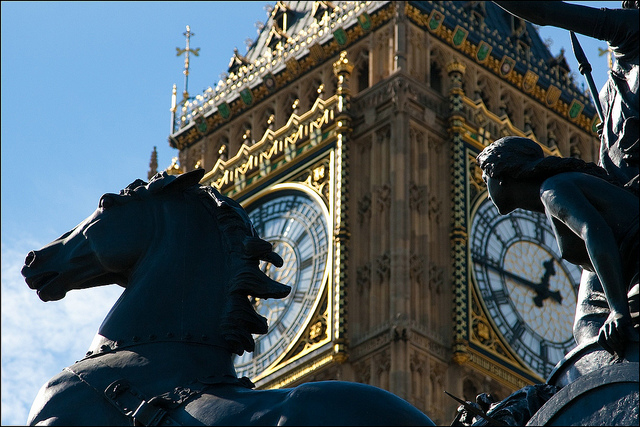If there is to be a UK constitutional convention, it should look at the future of parliamentary privilege
Parliamentary privilege is more than just the right of MPs and Lords to say what they like without fear of legal consequence. In a week when this constitutional convention has been in the news due to the Labour MP Jimmy Hood making allegations about a member of the House of Lords, Andrew Blick explains what exactly it encompasses, and argues that a UK constitutional convention might be well advised to look into clarifying and codifying this privilege.

Credit: Andrew Zehetbauer, CC BY ND 2.0
Labour MP Jim Hood is under scrutiny for making allegations about former home secretary Leon Brittan in the House of Commons. He was able to do so under what is known as parliamentary privilege.
The British parliament performs a variety of functions that are crucial to a democratic society. It votes on laws and resolutions, agrees how much money should be given to the government, holds ministers to account for their actions and acts as a forum for debate of issues of significant public interest. To be able to carry out these crucial tasks effectively, parliament needs a series of special legal arrangements that are collectively called its “privilege”.
Privilege has a number of dimensions. One of them involves parliament being able to organise its own internal business as it sees fit – a principle known as “exclusive cognisance”. This principle has extended as far as to mean that health and safety law does not apply within the Palace of Westminster.
What’s more, the courts are subject to a rule that they will not become engaged in proceedings that take place in parliament. Parliament has responsibility for disciplining its own members. It also possesses – in theory – other powers that it would not plausibly deploy in the modern day. Among them are the ability to impose unlimited fines, to imprison individuals for contempt of parliament and to carry out impeachment proceedings. Following the Iraq war of 2003 there was a doomed attempt to revive the latter and apply it to the then-prime minister Tony Blair.
Another aspect of parliamentary privilege is that members must be able to speak freely without fear of reprisal. Protection in this area comes from a wider protection for proceedings taking place in parliament. The precise meaning of proceedings is fluid but it does encompass the statements that members make and means that they are not subject to civil legal action for them. They are also protected from criminal prosecution over anything they say in proceedings. There are, however, balancing “sub judice” rules that parliamentarians do not compromise ongoing legal cases.
The sources of parliamentary privilege are ancient, gradually appearing out of English and then UK history. The most important statutory basis is the Bill of Rights of 1689. This document is probably as important as the Magna Carta. It was in part a response to the tyrannical, absolutist aspirations of the Stuart dynasty of the 17th century and was crucial to the development of limited, accountable and eventually democratic government. Article IX provided that: “the freedom of speech and debates or proceedings in parliament ought not to be impeached or questioned in any court or place out of parliament”.
Yet while privilege is clearly essential in some form in a state such as the UK, and its key source is a totemic feature of our constitution, it is the subject of controversy. Some hold that it can and has been abused. Members may misuse their freedom of speech to defamatory effect and some even sought to use it to escape prosecution in the wake of the expenses scandal. However, the Supreme Court decided in 2010 that their expenses and allowances did not fit within the general category of “proceedings” and therefore that the individuals involved were not exempt.
With these difficulties in mind, there have at times been calls for the clarification and codification of privilege and successive governments have considered it an option.
Will it ever happen? Perhaps it could be a task for a body we hear increasing reference to in political debate – a convention that would consider the constitutional future of the UK. Parliamentary privilege could form one of a growing number of items requiring attention by a body that speaks for the people of the UK as a whole. It would be a neat historical symmetry if a successor to the 1689 Bill of Rights, itself the product of a revolutionary convention that eventually decided it was a parliament, was created by a 21st-century equivalent to such an entity.
—
Note: this post originally appeared on the Conversation. It represents the views of the author and not those of Democratic Audit or the LSE. Please read our comments policy before posting.
—
![]()
 Dr. Andrew Blick is a Lecturer in Politics and Contemporary History at the Centre for Political and Constitutional Studies, King’s College London. He is an author of Democratic Audit’s 2012 Audit of Democracy.
Dr. Andrew Blick is a Lecturer in Politics and Contemporary History at the Centre for Political and Constitutional Studies, King’s College London. He is an author of Democratic Audit’s 2012 Audit of Democracy.





 Democratic Audit's core funding is provided by the Joseph Rowntree Charitable Trust. Additional funding is provided by the London School of Economics.
Democratic Audit's core funding is provided by the Joseph Rowntree Charitable Trust. Additional funding is provided by the London School of Economics.
If there is to be a UK constitutional convention, it should look at the future of parliamentary privilege https://t.co/H4aVmWDhC8
If there is to be a UK constitutional convention, it should look at the future of parliamentary privilege https://t.co/kFftSF8Sf4